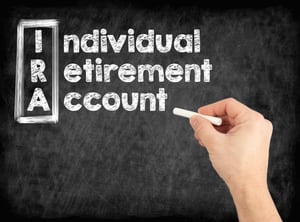 IRAs are exempt assets in bankruptcy proceedings, and are thus beyond the reach of the debtor’s creditors. The exemption in the Bankruptcy Code is based on the tax-exempt status of the IRA. 11 USC §522(d)(12) provides an exemption to “[r]etirement funds to the extent that those funds are in a fund or account that is exempt from taxation under section 408 of the Internal Revenue Code.”
IRAs are exempt assets in bankruptcy proceedings, and are thus beyond the reach of the debtor’s creditors. The exemption in the Bankruptcy Code is based on the tax-exempt status of the IRA. 11 USC §522(d)(12) provides an exemption to “[r]etirement funds to the extent that those funds are in a fund or account that is exempt from taxation under section 408 of the Internal Revenue Code.”
Although, IRAs are exempt assets in bankruptcy there are situations where an IRA may not be exempt, including inherited IRAs. While inherited IRAs are exempt from taxation under Section 408 of the Internal Revenue Code, the Supreme Court has held an inherited IRA is not a “retirement fund” because (1) new contributions can never be made to an inherited IRA, (2) distributions must be made over the beneficiary’s lifetime or within five years after the year of the IRA holder’s death and are not delayed until the beneficiary’s retirement and (3) withdrawals from an inherited IRA are not subject to the penalty for distributions prior to age 59-1/2 that applies to other IRAs, thus allowing for the beneficiary to withdraw funds at any time. Accordingly, the Supreme Court held that the inherited IRA is considered part of the bankruptcy estate and its assets can be reached by the debtor’s creditors.
An IRA may also lose its exempt status if the IRA is engaged in prohibited transactions. Code §497(c)(1) prohibits loan transactions between an IRA and a disqualified person. If an IRA engages in a prohibited transaction with the beneficiary or creator of the account, the IRA will lose its exempt status pursuant to Code §408(e)(2).
If a prohibited transaction occurred in regard to the IRA, like a loan transaction, it can be argued that the IRA is no longer exempt under Code §408(e)(2) and thus the IRA is no longer exempt in the bankruptcy. These prohibited transactions can be as simple as the participant receiving a distribution for a short period of time and then returning the funds to the IRA.
CALL NOW FOR A FREE STRATEGY SESSION FROM A MN BANKRUPTCY LAWYER AT LIFEBACK LAW FIRM
Before filing bankruptcy it is important to understand how your individual retirement accounts may be effected. Contact the attorneys at LifeBackLaw and see us at www.LifeBackLaw.com and let us help you get your life back.


